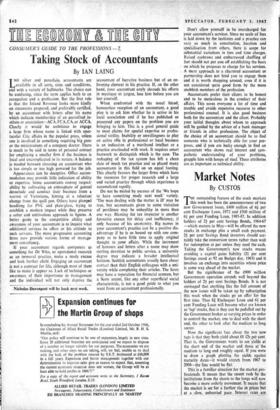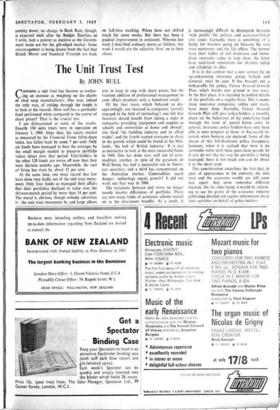Market Notes
By CUSTOS
THE outstanding feature of the stock markets this week has been the announcement of two new Government loans, £400 million of 61 per cent Exchequer Loan, 1972 and £500 million of 61 per cent Funding Loan, 1985-87. In addition holders of 2+ per cent Savings Bonds, 1964-67 —which mature in May—will be offered the new stocks in exchange plus a small cash payment. 21 per cent Savings Bond investors should cer- tainly take the conversion terms rather than wait for redemption at par unless they need the cash. Taking the Government's new stocks means avoiding a capital gains liability (21 per cent Savings stood at 92 on Budget day, 1965) and it involves an exchange into securities whose price is some way ahead of the market.
But the significance of the £900 million Government operation extends well beyond the holders of 21 per cent Savings Bonds. It is not envisaged that anything like the full amount of the new issues will be taken up by subscription this week when the stocks go on offer for the first time. Thus 61 Exchequer Loan and 61 per cent Funding Loan will become what are known as 'tap' stocks, that is they can be pedalled out by the Government broker at varying prices in order to control the market, one to deal with the short end, the other to look after the medium to long sector.
Now the significant fact about the two new taps is that they both yield about £6 12s per cent. That is, the Government wants to see yields at the short end of the market and those at the medium to long end roughly equal. If you were to draw a graph plotting the yields against maturity dates—it would stretch from 1967 to 2008—the line would be flat.
This is a familiar situation for the market pro- fessionals. It means that the recent rush by the institutions from the shorts to the longs will now become a more orderly movement. It means that the market is set for a further rise in prices but at a slow, unhurried pace. Interest rates are coming down; no change in Bank Rate, though, is expected until after the Budget. Equities, as I write, lack a pointer as decisive as the Govern- ment loans are for the gilt-edged market. Some encouragement is being drawn from the fact that British Motor and Standard Triumph are back on full-time working. Prices have not shifted much for some weeks. But there has been a gradual improvement in sentiment. Whereas last week I destribed ordinary shares as 'lifeless,' this week I would pin the adjective 'firm' on to their chests.































 Previous page
Previous page